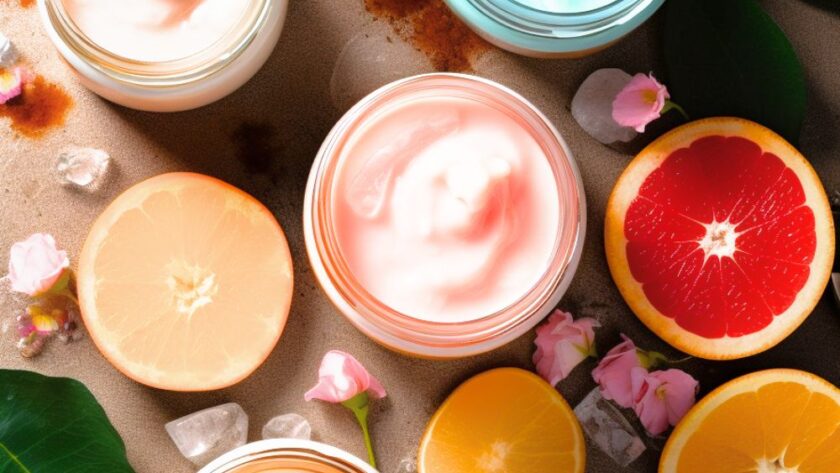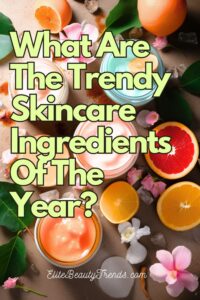If you’re curious about the latest skincare ingredients that have taken the beauty world by storm, look no further. This article explores the trendy skincare ingredients of the year that have captured the attention of beauty enthusiasts and skincare enthusiasts alike. From rejuvenating antioxidants to nourishing botanical extracts, discover the powerful ingredients that are making waves in the skincare industry. Get ready to elevate your skincare routine with these trendy must-haves.
Clean Beauty Ingredients
Clean beauty has become a popular trend in the skincare industry, with more and more consumers seeking out products that are free from harmful chemicals and potentially irritating ingredients. One of the key aspects of clean beauty is the use of organic ingredients. These are ingredients that have been grown without the use of synthetic fertilizers or pesticides, making them a safer and more natural choice for your skincare routine. Organic ingredients are often gentler on the skin and can provide nourishing benefits without any unwanted side effects.
Natural oils are also a staple in clean beauty products. These oils, derived from plants, are rich in essential fatty acids and antioxidants, providing numerous benefits for the skin. Different natural oils have different properties, such as hydrating, calming, or soothing the skin. Some popular natural oils used in skincare products include argan oil, rosehip oil, and jojoba oil. Whether you have dry, oily, or sensitive skin, there is likely a natural oil that can help balance and nourish your skin.
Plant extracts are another important component of clean beauty products. These extracts are derived from various parts of plants, including leaves, flowers, and roots. Plant extracts can provide a range of skincare benefits, such as soothing inflammation, brightening the complexion, and promoting collagen production. Some well-known plant extracts in skincare include aloe vera, chamomile, and green tea extracts. Incorporating plant extracts into your skincare routine can help you achieve healthier and more radiant skin.
Antioxidants
Antioxidants play a crucial role in skincare by protecting the skin against free radicals, which are harmful molecules that can cause damage to cells. One powerful antioxidant is vitamin C, also known as ascorbic acid. Vitamin C helps to neutralize free radicals and promote collagen production, resulting in firmer and more youthful-looking skin. It also helps to brighten the complexion and fade dark spots, making it a popular ingredient in products targeting hyperpigmentation.
Another beneficial antioxidant is vitamin E. This vitamin is known for its ability to nourish and hydrate the skin, leaving it soft and supple. Vitamin E also has anti-inflammatory properties, making it an excellent choice for soothing irritated and sensitive skin. Additionally, vitamin E acts as a natural preservative, helping to extend the shelf life of products and maintain their efficacy.
Green tea extracts are often used in skincare products for their antioxidant properties. Green tea is packed with polyphenols, which are powerful antioxidants that protect the skin from environmental damage. These extracts can help reduce inflammation, combat signs of aging, and even improve the appearance of acne-prone skin. Including products with green tea extracts in your skincare routine can give your skin an antioxidant boost and contribute to a healthier complexion.
Hyaluronic Acid
Hyaluronic acid is a skincare ingredient that has gained much attention in recent years. It is a naturally occurring substance in the body that helps to retain moisture and keep the skin plump and hydrated. As we age, the production of hyaluronic acid decreases, leading to dryness and the formation of fine lines and wrinkles. However, applying hyaluronic acid topically can help replenish the skin’s moisture levels, resulting in a smoother and more youthful complexion.
One of the key benefits of hyaluronic acid is its ability to boost hydration. Its high-water retention capacity allows it to hold up to 1000 times its weight in water, effectively delivering moisture to the skin and preventing dehydration. This hydration boost can leave the skin looking plumper, firmer, and more radiant.
In addition to its hydrating properties, hyaluronic acid also has the ability to plump the skin. By attracting moisture to the skin’s surface, it can help fill in fine lines and wrinkles, giving the skin a smoother and more youthful appearance. Regular use of hyaluronic acid can help combat the signs of aging and promote a more vibrant complexion.
Furthermore, hyaluronic acid has been shown to have wrinkle-reducing effects. By maintaining the skin’s moisture levels, it helps to improve the elasticity and firmness of the skin. This can lead to a reduction in the appearance of wrinkles and fine lines, giving you a more youthful and refreshed look.
Retinol
Retinol is a popular ingredient in anti-aging skincare products due to its numerous benefits for the skin. It is a derivative of vitamin A and has been proven to effectively target signs of aging, improve skin texture, and fade pigmentation.
One of the key benefits of retinol is its anti-aging effects. It stimulates the production of collagen, a protein that is essential for maintaining the skin’s elasticity and firmness. As we age, collagen production naturally decreases, leading to the formation of wrinkles and fine lines. By increasing collagen production, retinol can help reduce the appearance of these signs of aging and promote a smoother and more youthful complexion.
In addition to its collagen-boosting effects, retinol also improves skin texture. It promotes cell turnover, helping to remove dead skin cells and reveal fresher and more even-toned skin. Regular use of retinol can result in a smoother and more refined complexion, with reduced roughness and the appearance of pores.
Retinol is also known for its ability to fade pigmentation. Whether it’s sun spots, age spots, or post-inflammatory hyperpigmentation, retinol can help lighten these darkened areas and even out the skin tone. By inhibiting the production of melanin, the pigment responsible for skin color, retinol can gradually diminish the appearance of pigmentation and give the skin a more uniform and radiant look.
Peptides
Peptides are small chains of amino acids that play a crucial role in various skin functions. When applied topically, peptides can stimulate collagen production, reduce fine lines and wrinkles, and improve skin elasticity.
One of the key benefits of peptides is their ability to stimulate collagen production. Collagen is a protein that provides structure and support to the skin, keeping it firm and supple. As we age, collagen production naturally declines, leading to the formation of wrinkles and sagging skin. Peptides can help counteract this by signaling to the skin to produce more collagen, resulting in a plumper and more youthful complexion.
In addition to collagen production, peptides also help reduce the appearance of fine lines and wrinkles. They work by relaxing the muscles beneath the skin, smoothing out the surface and minimizing the look of expression lines. Regular use of products containing peptides can help soften the effects of aging and give the skin a smoother and more rejuvenated appearance.
Peptides also contribute to improving the skin’s elasticity. By strengthening the skin’s structure, peptides help to improve its firmness and resilience. This can lead to a more lifted and toned complexion, with reduced sagging and improved overall elasticity. Incorporating peptides into your skincare routine can help you achieve firmer and more youthful-looking skin.
Niacinamide
Niacinamide, also known as vitamin B3, has gained popularity in the skincare world for its ability to address various skin concerns. It is a versatile ingredient that offers a wide range of benefits, from reducing oiliness to minimizing pores and evening out skin tone.
One of the main benefits of niacinamide is its ability to reduce oiliness. It regulates the production of sebum, the skin’s natural oil, helping to keep the skin balanced and less prone to excess oiliness. This can be particularly beneficial for those with oily or combination skin, as it can help control shine and prevent breakouts.
Additionally, niacinamide has been found to minimize the appearance of pores. By regulating sebum production and improving the skin’s overall texture, it can help tighten and refine the pores, giving the skin a smoother and more refined appearance. This can result in a more even and flawless complexion.
Furthermore, niacinamide is known for its skin brightening properties. It inhibits the transfer of melanin, the pigment responsible for dark spots and uneven skin tone, helping to reduce hyperpigmentation and promote a more even complexion. Regular use of niacinamide can help fade dark spots and give the skin a brighter and more radiant look.
Glycolic Acid
Glycolic acid is a type of alpha hydroxy acid (AHA) that is widely used in skincare products for its exfoliating properties. It works by loosening the bonds between dead skin cells, allowing them to be easily sloughed off and revealing fresh and glowing skin underneath.
One of the main benefits of glycolic acid is its ability to exfoliate dead skin cells. As we age, the skin’s natural exfoliation process slows down, leading to a buildup of dead skin cells on the surface. This can result in a dull and lackluster complexion. By using products with glycolic acid, you can effectively remove this buildup and promote a brighter and more radiant complexion.
In addition to exfoliation, glycolic acid also helps to brighten the complexion. By removing dead skin cells, it allows light to reflect off the skin more evenly, resulting in a more luminous and youthful appearance. Regular use of glycolic acid can help improve the overall brightness and clarity of the skin.
Furthermore, glycolic acid has the ability to smooth fine lines and wrinkles. By exfoliating the surface layer of the skin, it stimulates cell turnover and promotes the production of collagen. This helps to plump the skin and reduce the appearance of fine lines, resulting in a smoother and more youthful-looking complexion.
Ceramides
Ceramides are naturally occurring lipids that form a protective barrier on the skin’s surface. They play a crucial role in preserving moisture and preventing water loss, making them essential for maintaining healthy and hydrated skin.
One of the key benefits of ceramides is their ability to strengthen the skin barrier. The skin barrier is the outermost layer of the skin, and its role is to protect against environmental aggressors and maintain optimal moisture levels. Ceramides help to reinforce this barrier by filling in gaps and preventing moisture from evaporating, resulting in a stronger and more resilient skin barrier.
Additionally, ceramides are excellent at retaining moisture. They act as a natural moisturizer, helping to lock in hydration and prevent dryness. This is particularly beneficial for those with dry or dehydrated skin, as ceramides can help replenish and maintain the skin’s moisture levels, resulting in a more hydrated and plump complexion.
Furthermore, ceramides have soothing properties that can help calm and heal irritated skin. They help to repair the skin barrier and restore its natural balance, reducing redness and inflammation. Whether your skin is prone to sensitivity or you’ve had a reaction to a product, incorporating ceramides into your skincare routine can help soothe and restore your skin.
Bakuchiol
Bakuchiol is a natural and plant-derived alternative to retinol, offering similar benefits without the potential side effects often associated with retinol use. It is derived from the seeds of the Psoralea corylifolia plant and has gained popularity for its ability to improve skin firmness and reduce wrinkles.
One of the primary benefits of bakuchiol is its retinol-like effects. It stimulates collagen production and promotes cell turnover, resulting in improved skin firmness and elasticity. By increasing collagen levels in the skin, bakuchiol can help reduce the appearance of wrinkles and fine lines, giving the skin a smoother and more youthful appearance.
Unlike retinol, which can sometimes cause irritation and sensitivity, bakuchiol has been found to be well-tolerated by most skin types. It offers similar anti-aging benefits without the potential drawbacks, making it a great alternative for those with sensitive skin or those looking for a gentler option.
Furthermore, bakuchiol is a potent antioxidant, providing protection against free radicals and environmental damage. It helps to neutralize damaging molecules and prevent premature aging, contributing to a healthier and more youthful complexion. By incorporating products with bakuchiol into your skincare routine, you can enjoy the benefits of an effective anti-aging ingredient without any potential irritation.
Probiotics
Probiotics, often associated with gut health, are also making their way into the skincare industry. These beneficial bacteria can have a positive impact on the skin’s microbiome, the community of microorganisms that live on the skin’s surface.
One of the main benefits of probiotics is their ability to balance the skin’s microbiome. The skin’s microbiome plays a crucial role in maintaining a healthy skin barrier and protecting against harmful bacteria. However, factors such as harsh skincare products or environmental aggressors can disrupt this balance, leading to irritated and sensitive skin. Probiotics help to restore and maintain a healthy microbiome, reducing inflammation and promoting overall skin health.
Additionally, probiotics have calming properties that can help soothe inflammation. They act as natural anti-inflammatories, reducing redness and irritation in the skin. This can be particularly beneficial for those with sensitive or acne-prone skin, as probiotics can help calm breakouts and promote a more balanced complexion.
Furthermore, probiotics contribute to overall skin health. By supporting the skin’s microbiome, they help to strengthen the skin barrier and support its natural functions. This can result in healthier and more resilient skin that is better able to defend against environmental stressors. Adding products with probiotics to your skincare routine can help promote a healthier and more vibrant complexion.





